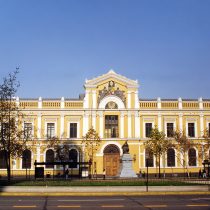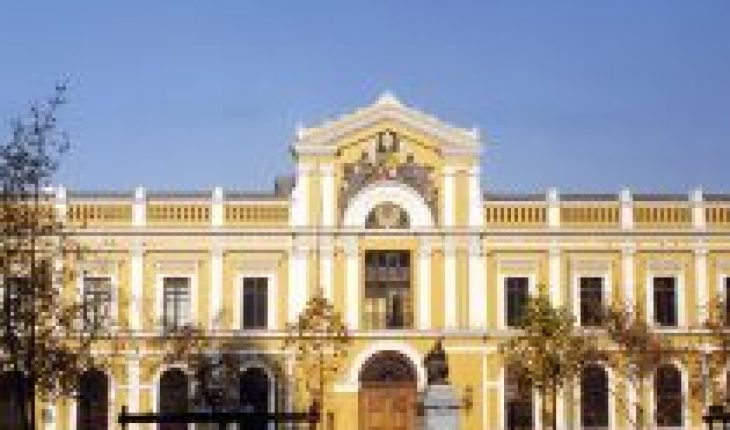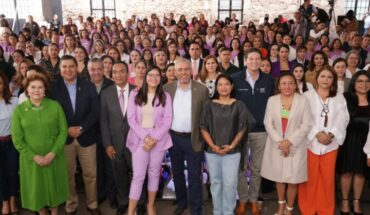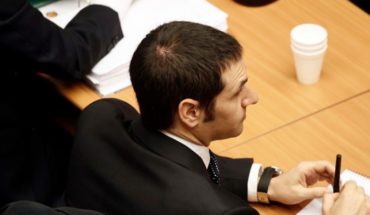
Eight of the conventiones of the native peoples arrived this morning at the Central House of the University of Chile, representing the total of 17 that make up the constituent body, to talk with the rector of the house of studies, Ennio Vivaldi. In the instance, they addressed the support that the different public universities of the State can provide to the conventional ones of the 10 indigenous peoples that are present in the Constitutional Convention, in technical, technological and infrastructure aspects, together with the dependencies of the schools present throughout the country, were again made available to facilitate the work of the native peoples.
In this context, for about 40 minutes, the 8 representatives had a first approach with the facilities of the Central House of the University of Chile and met with authorities and university representatives such as the Rector Ennio Vivaldi, the Vice-Rector for Extension and Communications, Faride Zerán; the Vice President of the University Senate, Verónica Figueroa Huencho; the Director of Institutional Relations, Juan Gabriel Valdés; and Salvador Millaleo, academic at the Faculty of Law and promoter of the Indigenous Constitutional Platform of the U. of Chile. At the end of the meeting, it was agreed to hold a new meeting to make a tour of the dependencies of the Central House, which has different rooms, meeting rooms and spaces enabled for the activities that can develop the conventional constituents, with permitted capacity and complying with sanitary measures.
“We welcome you with open arms, with emotion and of course this house is at your disposal,” rector Vivaldi said at the meeting, who also specified that this support goes beyond the use of the infrastructure: “we would like you to also use the installed capacity that we have and that we are supporting all the work with the constituent assembly.” , especially relieving “the important role played by academics and students of the native peoples”, as well as the Uchile Constituent repository that houses all the academic material produced by the university on the different topics that will be addressed during this process. To this is added the will to make available to the Convention the television channel of the University, so that it transmits the sessions through the open signal HD to the whole country.
The conventional ones present at the meeting valued the academic support that the Casa de Bello can provide, through different documents that will be available to the conventional ones.
“I welcome the willingness of the U. of Chile so that we as peoples and as seats can work together, so that we continue to join forces so that this new constitution represents diversity and that it incorporates us with full rights in the history of our country,” said Tiare Aguilera, a convention of the Rapa Nui people.
Meanwhile, the conventional of the Mapuche people, Victorino Antilef, stressed that “this exercise of conversation that is taking place, and the disposition that the university is showing us, is adding to a relevant exercise that has to put us in a different context, and that is related to a new way of relating and living together in a space that , hopefully, after this process, it has changed and is very different from how the presence of first nations has been recognized within the territory today.”
For his part, the conventional Wilfredo Bacián, constituent of the Quechua people, stressed the importance that the gaze of the academy can have in this process: “It is not only a question of refounding Chile, but also of refounding the history of the native peoples,” he said, relieving that the look that the academy can be “of reunion with each of those native peoples , valuing and respecting the particularity of each of them”.
Isabel Godoy, representative of the Colla people, said that the “first nations have a different way of working with our conventional ones,” so a space like the one provided in the U. of Chile has the “conditions to have this that is the rich thing of the conversation: to look us in the eyes when talking that is what we native peoples like that is often difficult for the rest of the people to understand.”
Félix Galleguillos, representative of the Atacameño people, desthe discussed this “new way of relating”, given that the native peoples, he said, “have always been in theory critical of all the universities and educational establishments”, because they have “always been subjects of study and there has not been a direct link with their inhabitants and then with the return of such research”.
“For us as native peoples it is very important to work in a group, we want to give a stamp to our work as native peoples, so the space is very much appreciated,” said Lidia González, representative of the Yagán people.
“The 17 constituents are very grateful to the university, that they give us the space and be able to count on the infrastructure. And not only that, but everything that is within their reach and that we could require,” said Adolfo Millabur, representative of the Mapuche people, who also said that “as native peoples we need to see each other’s faces, we need to talk, and for that the university offers us its spaces.” Likewise, Millabur indicated that the spaces enabled for meeting in the Pereira Palace as in the Former Congress, “do not meet the minimum conditions so that we do not meet the 17, even less with our support teams”, so with this collaboration “we are fulfilling this task of being able to open a space”.
The conventional of the Mapuche people, Alexis Caiguan, added that “opening the doors of the University means generating an empathy with the native peoples, because these instances need to make it appear that society itself is committed. And in this case, the University.”
From the U. of Chile, the vice president of the University Senate and one of the promoters of the materialization of this support, Verónica Figueroa Huencho, said that this milestone constitutes “an important vindication of dreams, of longings of our ancestors, of our ancestors”, who “also dreamed of being part of the decisions of this country, and you today represent that dream , that diverse longing of all our native peoples and of which we are part.”
For Juan Gabriel Valdés, with this approach that is being made “we are collecting a will of the university community, of the professors, the students, the officials, to make a contribution with your ideas, to the work that you are doing in all areas. And in this context, a real participation of the members of the native peoples is fundamental, in each of the issues, from education, housing, the issues that have to do with decentralization, and especially what has to do with the plurinational, the multicultural”.
This is the second opportunity in which Rector Vivaldi meets with representatives of the Convention, within the framework of the offer made by the public schools to use their headquarters and infrastructure to help develop the work of the organization in the best way. On Tuesday, July 6, President Elisa Loncon, along with Vice President Jaime Bassa, also visited the Central House to get up to date with the help and support they could receive, for the best performance of their duties.





